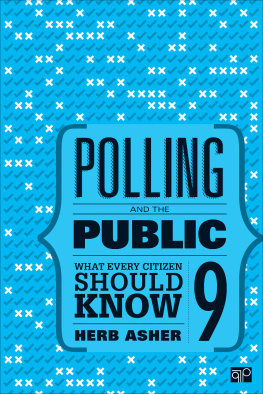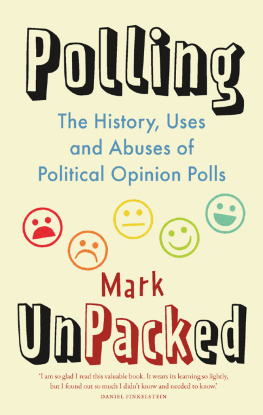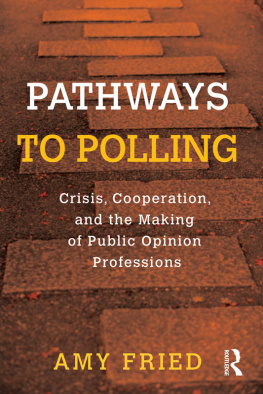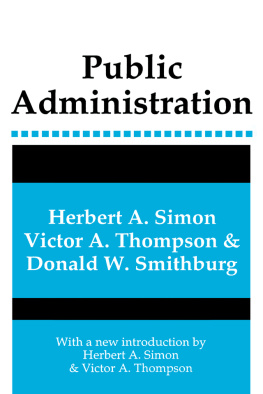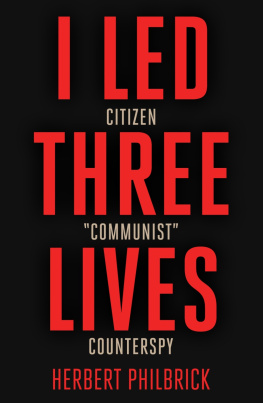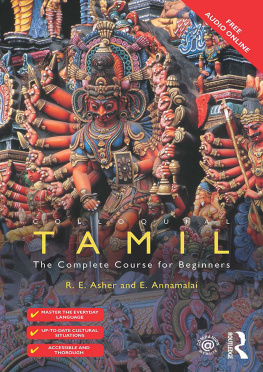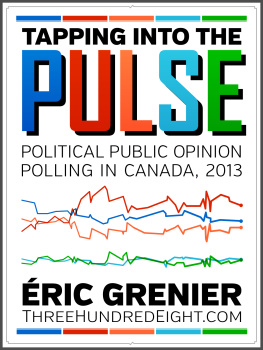FOR INFORMATION:
SAGE Publications, Inc.
2455 Teller Road
Thousand Oaks, California 91320
E-mail: order@sagepub.com
SAGE Publications Ltd.
1 Olivers Yard
55 City Road
London, EC1Y 1SP
United Kingdom
SAGE Publications India Pvt. Ltd.
B 1/I 1 Mohan Cooperative Industrial Area
Mathura Road, New Delhi 110 044
India
SAGE Publications Asia-Pacific Pte. Ltd.
3 Church Street
#10-04 Samsung Hub
Singapore 049483
Copyright 2017 by CQ Press, an Imprint of SAGE Publications, Inc. CQ Press is a registered trademark of Congressional Quarterly Inc.
All rights reserved. No part of this book may be reproduced or utilized in any form or by any means, electronic or mechanical, including photocopying, recording, or by any information storage and retrieval system, without permission in writing from the publisher.
Printed in the United States of America
Library of Congress Cataloging-in-Publication Data
Names: Asher, Herbert B., author.
Title: Polling and the public : what every citizen should know / Herbert Asher.
Description: Ninth edition. | Thousand Oaks, California : CQ Press, [2017] | Includes bibliographical references and index.
Identifiers: LCCN 2016010218 | ISBN 978-1-5063-5242-8 (pbk. : alk. paper)
Subjects: LCSH: Public opinion polls. | Public opinionUnited States.
Classification: LCC HM1236 .A75 2017 | DDC 303.3/80973dc23 LC record available at http://lccn.loc.gov/2016010218
This book is printed on acid-free paper.
Acquisitions Editor: Michael Kerns
Editorial Assistant: Zachary Hoskins
Production Editor: Laura Barrett
Copy Editor: Jared Leighton
Typesetter: C&M Digitals (P) Ltd.
Proofreader: Jeff Bryant
Indexer: Judy Hunt
Cover Designer: Gail Buschman
Marketing Manager: Amy Whitaker
Preface
Since the last edition of this book was published, the prominence and pervasiveness of public opinion polling in the United States and throughout the world have continued to grow. Americans have been routinely queried about their views on ISIS and the broader war against terrorism, the state of the American economy, health care reform, and the performance of the president. In response to unfolding events, other issues such as immigration, gay marriage, and policecommunity relations became popular topics for public opinion polling.
Not only could Americans learn from the polls what their fellow citizens thought about various topics, but they could also learn what citizens of other nations thought about the United States, American culture, the policies of the American government, and prominent Americans such as Donald Trump. For example, Americans learned that the citizenry of many Middle East nations strongly disapproved of aspects of American foreign policy. Indeed, the democratization of many previously authoritarian nations and the internationalization of public opinion polling have meant that people all over the world can now express their views through polls and also learn what people in other nations are thinking.
In the lead up to the 2016 American presidential campaign, the polls became ever more prevalent, even to the point of determining which Republican presidential aspirants were allowed to participate in the ongoing series of GOP presidential debates. The media coverage of the Republican and Democratic nomination battles was excessively poll driven, and media outlets often encountered difficulties deciding which polls and poll results merited coverage.
In the past decade, polling has faced new technical and methodological challenges. Traditional telephone polling has become more difficult with the increased reliance on cell phones, the decrease in landline usage, and the wider use of call-screening devices. The huge growth in Internet use has resulted in a dramatic increase in web surveys, some done with care and sensitivity to good polling standards, and others simply contemporary versions of the pseudopolls often conducted by news media and other organizations, in which respondents select themselves to participate. Thus, we are witnessing major developments in polling with respect to the substantive topics amenable to polling, the geographical reach of the polling enterprise, and the methodological challenges facing pollsters.
Despite their prominence, polls are still not well understood by many Americans. My central objective when I first wrote this book was to help readers become wiser consumers of public opinion polls. In preparing this ninth edition, I still have that same objective. The prevalence of public opinion polls and their frequent misuse make it imperative that citizens be able to evaluate critically the assertions that people, organizations, and governments make on the basis of polls. Candidates for public office, officeholders, and many different public, private, and nonprofit groups sponsor public opinion surveys to advance their own objectives. As polling data become more central to political and civic discourse, it is more important that citizens understand the factors that can influence poll results.
But the challenges to becoming wise consumers of public opinion polls have become more daunting with the proliferation of good and bad polling, especially via the Internet, and with more and more entities utilizing polls to advance their own interests. And with the fragmentation of traditional communications outlets and the growth of social media, there will be ever more paths by which poll results are transmitted to citizens. But who will be the gatekeepers in this transmission process? In many cases, it will be no one; the polling data will simply be available through a variety of sources. But in other instances, the gatekeepers themselves may not be competent to evaluate good versus bad polling, and therefore, they inadvertently (or deliberately) facilitate the widespread dissemination of good and bad, accurate and inaccurate information to the American public. The typical American will have more access to polls and poll results than in the past, and the access points may be direct or indirect, traditional or nontraditional, reputable or disreputable. Thus, the increasingly difficult challenges for citizens will be to sort out the good from the bad and to avoid being misled and manipulated by the polls.
As I have tried to help readers become better consumers of polls, I have also had to establish boundaries and limits for this book. Most of my focus is on consumers of polls on public issues; I give scant attention to research that focuses on consumer preferences in the marketplace. I have also tended to use as major sources the academic journals and books that focus on public opinion, and I devote little attention to the huge volume of publications on market research. Finally, in covering various topics and controversies, I often provide only a small sampling of the relevant literature and research, lest this book become overly detailed, technical, inaccessible, and incredibly long.




